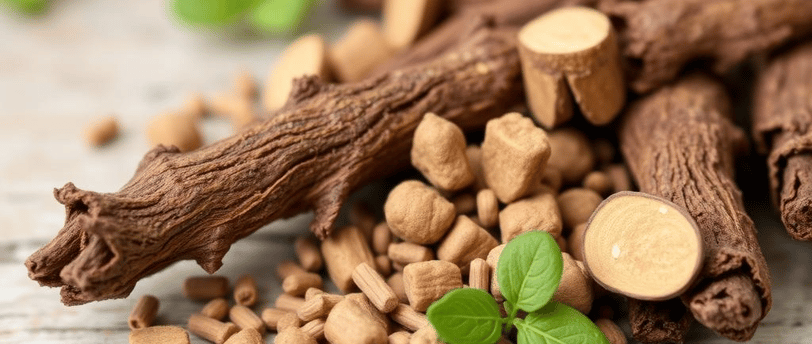Licorice Root: A Natural Soother for Respiratory Health
🌬️RESPIRATORY HEALTH


For centuries, cultures around the world have turned to nature's pharmacy for remedies to soothe common ailments. Among these time-tested treasures is licorice root, a potent herb recognized for its diverse health benefits, particularly its ability to soothe the throat and support overall respiratory health.
While often associated with the sweet confection, licorice root offers far more than just a distinctive flavor. The key to its therapeutic properties lies in its unique compounds, including glycyrrhizin, which possesses anti-inflammatory, antiviral, and expectorant actions. These properties make licorice root a valuable natural remedy for a variety of respiratory issues.
How Licorice Root Benefits Your Respiratory System:
Soothes a Sore Throat: Licorice root's demulcent properties create a soothing coating over the throat, providing relief from irritation and reducing inflammation. This makes it a popular ingredient in lozenges and teas designed to combat coughs and sore throats.
Acts as an Expectorant: By promoting the expulsion of mucus from the airways, licorice root can help clear congestion and ease breathing. Its expectorant action helps loosen phlegm, making it easier to cough up and preventing it from settling in the lungs.
Reduces Inflammation: The anti-inflammatory properties of glycyrrhizin can help reduce inflammation in the airways, easing breathing difficulties associated with conditions like asthma and bronchitis.
Supports Immune Function: Licorice root contains compounds that can boost the immune system, helping the body fight off respiratory infections more effectively. This can be particularly beneficial during cold and flu season.
Incorporating Licorice Root into Your Routine:
There are several ways to reap the benefits of licorice root:
Licorice Root Tea: A warm cup of licorice root tea can be incredibly soothing for a sore throat. Simply steep dried licorice root in hot water for 5-10 minutes.
Licorice Lozenges: Many throat lozenges contain licorice root extract for its soothing properties.
Herbal Supplements: Licorice root is available in capsule or tablet form as a dietary supplement.
Topical Applications: For skin conditions around the nose or chest, topical creams containing licorice extract may provide relief.
Important Considerations:
While generally safe for most people, licorice root should be used with caution due to its potential side effects.
High Blood Pressure: Glycyrrhizin can cause sodium and water retention, which may elevate blood pressure. Individuals with hypertension should avoid excessive consumption of licorice root.
Potassium Levels: Licorice root can lower potassium levels. Those taking medications that affect potassium or who have potassium deficiencies should consult with their doctor before using licorice root.
Pregnancy: Pregnant women should avoid licorice root as it may potentially affect hormone levels.
Drug Interactions: Licorice root can interact with certain medications, including diuretics and blood thinners. It's crucial to discuss licorice root use with your doctor, especially if you're taking other medications.
Conclusion:
Licorice root offers a natural and time-honored approach to supporting respiratory health. Its soothing, expectorant, and anti-inflammatory properties can provide relief from sore throats, congestion, and other respiratory ailments. However, as with any herbal remedy, it's essential to be aware of potential side effects and consult with a healthcare professional to ensure safe and effective use. By understanding its benefits and limitations, you can harness the power of licorice root to promote a healthier and more comfortable respiratory system.
